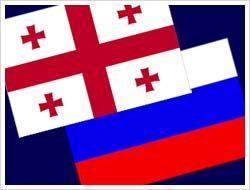The battle of the Georgia report begins
 Brussels - Thirteen months after the guns fell silent, Georgia and Russia are at it again.
Brussels - Thirteen months after the guns fell silent, Georgia and Russia are at it again.
The difference from their brief war in 2008 is that, this time, the warriors in the conflict are diplomats - and their words are anything but diplomatic.
"The report proves that Georgia came under invasion by a foreign state in violation of international law. The pretexts (for the invasion) were blatant lies," Georgia's ambassador to the EU, Salome Samadashvili, told journalists in Brussels.
Russia's ambassador to the EU, Vladimir Chizhov, retorted that the report "confirms what we knew all along: who started the war, and who bears the responsibility for it."
That man is Georgian President Mikheil Saakashvili, who "should have resigned long ago," Chizhov said, speaking almost simultaneously a few blocks away in central Brussels.
At noon on Wednesday, Swiss diplomat Heidi Tagliavini presented her long-awaited report on the outbreak of war between Georgia, on the one side, and Russia and the breakaway Georgian regions of South Ossetia and Abkhazia, on the other, in August 2008.
The 1,200-page report was due to be published online at 5 pm.
According to a copy seen by the German Press Agency dpa shortly after 1 pm, it concluded that Georgia had broken international law by attacking separatists in South Ossetia, but that Russia had also broken the law by invading Georgia in reply.
And a document which the EU had hoped would inspire future peace efforts quickly sparked an early-afternoon battle as the one-time combatants seized the brief window of opportunity to spin the report in their own direction before it was released to the world.
Less than an hour after she had entered the EU's headquarters to collect her copy of the report, Samadashvili was back in her embassy a mile away, telling journalists that it proved Russia's guilt - even though she admitted that she had not read it in detail.
An hour after that, at 2 pm, Chizhov, in his embassy a mile away in the other direction, declared that the document proved Georgia's guilt, but refused to answer questions on the accusation that Russia, too, had broken international law - because he had not read it yet.
"I assume you have not read the report: neither have I, so I will not comment on rumours and leakages," he said.
And just as Chizhov finished speaking, at 3 pm, Samadashvili called a second press conference halfway between the rival embassies to say that the document still proved that Georgia was right, even after she had read it.
"Any investigation has two sides. One is the facts, and the other side is the question of interpretation," she said defiantly.
By mid-afternoon, the row had spread to Moscow and Tbilisi, with both sides claiming that the report proved that they were right.
And as diplomats from the EU's 27 member states settled down to wade through the full 1,200 pages of Tagliavini's historical whodunnit, one thing was clear: the battle for Georgia may be over, but the battle over the Georgia report has only begun. dpa